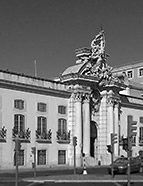

The administrative archive that had been housed in the Navy Arsenal building since 1878 was also transferred to Santa Clara in January 1885. By Decree of 26 December 1891, a Commission was appointed with the task of selecting and classifying historical documents, itemising those that should be kept or discarded, and among the former, those to be published, left in the War Ministry Archive, transferred to the Torre do Tombo, or to other Public Archives and Libraries.
The oldest archive exclusively related to military affairs resulted from the creation of the War Council on 11 December 1640, with the Regulation of 22 December 1643, stipulating that it would deal with military affairs, in particular the organisation of the army and navy, appointment of officers, fortifications, operation projects, military justice, and discipline. After the establishment of the Secretary of State for Foreign Affairs and War in 1736, the importance of the War Council was greatly limited, but it continued to have advisory functions until 1834. However, the War Council archive fell under the State Secretariat and after the 1755 earthquake was housed in the aforementioned Palácio do Pátio das Vacas in Ajuda along with other archives. Following the path of the archives in which it was integrated, the War Council archive only met a different fate when, in 1865, by decree of the Kingdom Ministry of 22 June, work was to begin to inventory and transfer it to the Torre do Tombo. Cláudio Chaby was appointed to carry out these tasks, and the respective documentation was transferred and sent to the Torre do Tombo in 14 instalments between 1868 and 1889, where it remains today.
On 20 July 1802, the Prince Regent, future King John VI, created the position of Inspector of Borders and Maritime Coasts, tasked with "carefully examining the state of the borders and maritime coasts, proposing the most appropriate defence plans, preparing military charts and maps of the forts, towers, and positions ordered." Shortly after, by decree of 4 September of the same year, the Prince Regent established the Military Archive (Archivo Militar, in the spelling of the time). It is justified by the decree which states that as "it is important that these important works are faithfully and carefully preserved and arranged in the order and method that can best facilitate their use, it is incumbent upon me to create a Military Archive for this purpose, where not only all the works that I order to be carried out by the Inspection must be gathered, but also all the existing memories, military charts, and plans, both those related to this Monarchy and its Colonies, as well as those concerning Foreign Countries."
